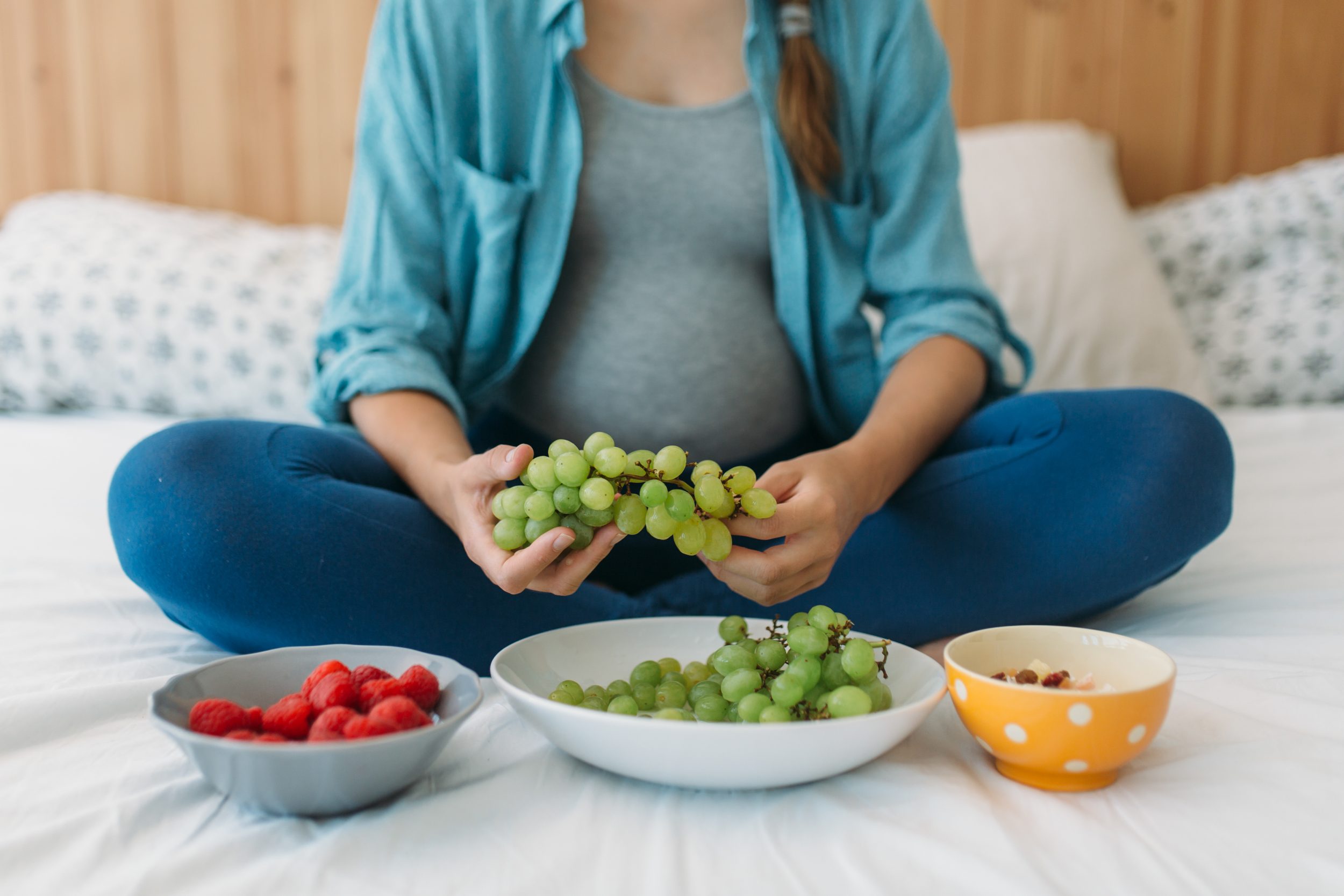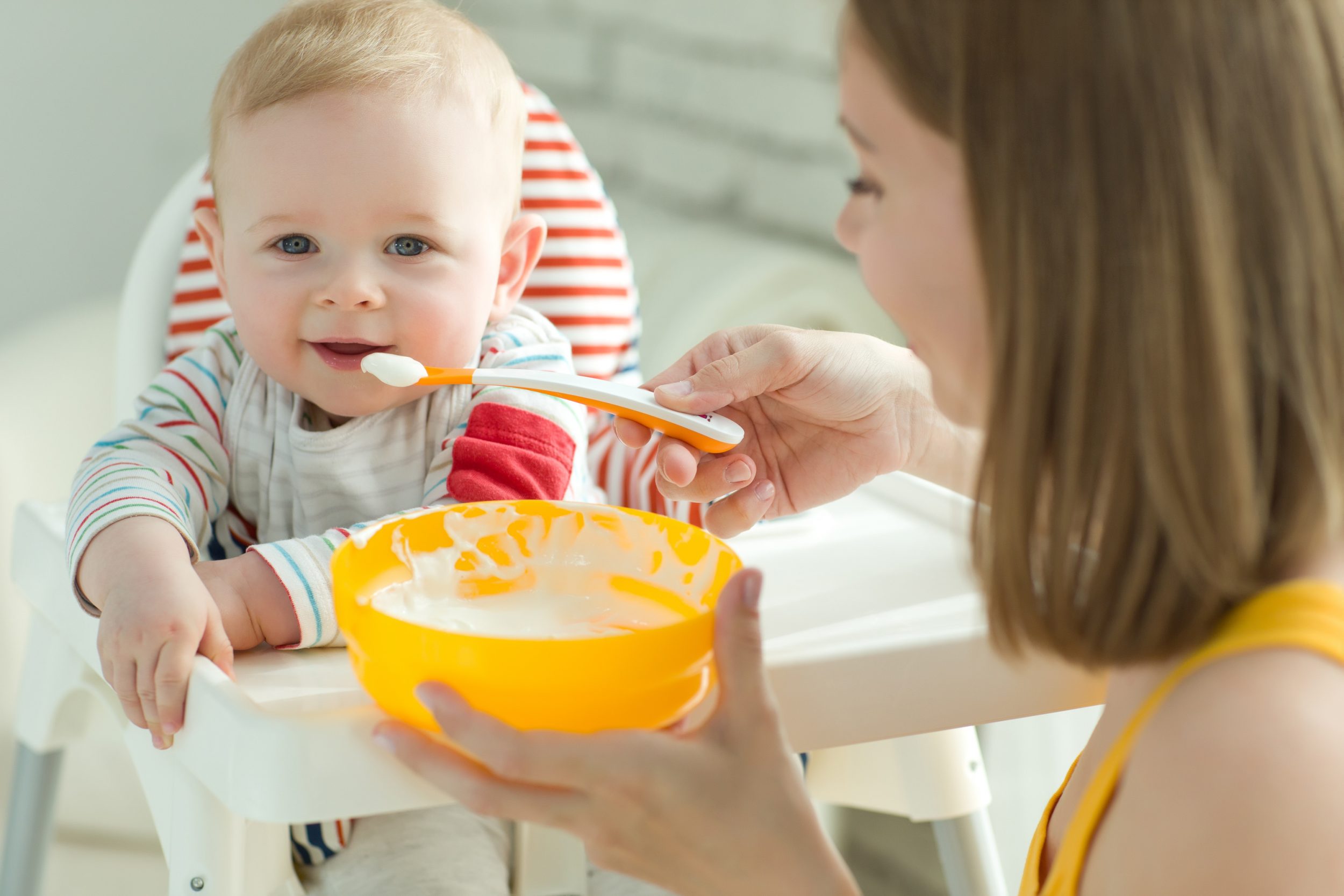Pregnancy
Here you will find frequently asked questions including answers on nutrition and exercise during pregnancy.

There is a myth that says you should eat for two. This myth is not true. During pregnancy, you only need about 250 kcal more per day in the second trimester (13th - 27th week of pregnancy). This can easily be covered by a snack such as an apple and a carton of butter and milk or a graham roll with cheese and tomato. In the third trimester (28th to 40th week of pregnancy) you need another 250 kcal more per day, i.e. a total of 500 kcal more per day. You can satisfy your hunger with:
- Colourful lentil stew
- Pike-perch with polenta and tomato salad.
It is important to cover the additional energy requirement with nutrient-rich foods such as vegetables, pulses, fruit, wholemeal products and dairy products.
During pregnancy, it is particularly important to regularly consume enough energy and nutrients to keep yourself and your baby adequately nourished. It is advisable to eat five meals throughout the day, including:
- 3 main meals
- 2 snacks
Remember to drink enough!
You should drink at least 1.5 litres a day to ensure you drink enough fluids. The best drinks for this are
- Tap water
- Still mineral water
- Unsweetened fruit tea
- Highly diluted 100% fruit and vegetable juices
Caution! Certain drinks are taboo during pregnancy and some should only be consumed in small quantities:
You should not drink alcohol during pregnancy! Please note that the following foods may also contain residual alcohol:
- Pastries
- Sweets
- Cooked sauces
The consumption of drinks with caffeine should be limited: no more than 2-3 cups of coffee or no more than 4 cups of green or black tea per day. Please note that drinks such as iced tea, cola, iced coffee and soft drinks may contain caffeine. Drinks with guarana can also contain caffeine. Pregnant women should avoid drinks with a lot of caffeine (e.g. energy drinks). They should also avoid sweetened drinks.
You should not drink drinks containing quinine (e.g. tonic water, bitter lemon) during pregnancy.
An adequate supply of folic acid is important for the optimal growth of the child. Women who wish to have children and pregnant women should ensure that they have an adequate supply of this vitamin. Women who could become pregnant should also pay attention to this. Please talk to your doctor about taking additional folic acid supplements.
Folic acid is naturally contained in:
- Vegetables such as lettuce, spinach, fennel, broccoli and various types of cabbage are healthy. Pulses such as lentils, beans, peas and chickpeas are also recommended. The following foods are recommended for a healthy diet:
- Wholemeal products (e.g. bread, pastries, muesli, pasta)
- Fruit (e.g. strawberries, raspberries, oranges, bananas)
- Nuts
- Milk products (do not use raw milk products) Observe hygiene rules!
Fatty marine fish such as salmon are good for omega-3 fatty acids. Domestic fish from cold water such as trout are also suitable. This is good for the child's development. Sea fish are also an important source of iodine. There is even evidence that eating fish during pregnancy can protect against allergic diseases in the child. It is advisable to eat fish 1-2 times a week.
During pregnancy, you should avoid predatory fish that may contain heavy metals. These include
- Tuna
- Swordfish
- Heil-Butt
- Pike
- Butter-Fish
- Snapper
- Shark
- Marlin
- King mackerel
- Butter mackerel
- Snake mackerel
You should avoid the following during pregnancy:
- Raw fish like sushi
- Raw seafood such as oysters
You should not eat these foods. You should also avoid smoked and pickled fish such as smoked salmon, smoked trout or gravad salmon during pregnancy to protect yourself from a possible infection with bacteria.
The general rule during pregnancy is: "no raw milk and raw milk products"!
For soft cheeses such as Brie and Camembert as well as smear cheeses such as Tilsiter and Quargel, there is a stricter guideline to protect against infection with bacteria. You should not eat these types of cheese during pregnancy, regardless of whether they are made from raw milk or pasteurised milk.
Pregnant women should avoid the following for precautionary reasons:
- Sushi
- raw fish
- Semi-cooked fish Raw or undercooked fish
can cause foodborne infections, such as an infection with listeria. If a pregnant woman becomes infected, the disease can also pass to the child in the mother's womb. This can lead to serious illness in the newborn.
Small amounts of alcohol are also strongly discouraged during pregnancy. This can have a negative impact on the physical and mental development of the unborn child.
Please also refrain from cooking alcohol, as a certain residual alcohol content remains. This cooking method should be avoided as:
- The flavour is influenced.
- It is inappropriate to use alcohol in cooking, especially if it is for children.
Yes, you should definitely take the same precautions regarding high-risk foods, even if you are toxoplasmosis positive. These foods can harm the child because they can transmit pathogens such as listeria, salmonella and others. Toxoplasma is an example of this. It is important to heat food sufficiently and to pay attention to careful kitchen hygiene in order to kill pathogens.
On our homepage you will find an overview of foods that you should avoid during pregnancy. There are also hygiene tips. You can find the overview under the menu item ‘Risk foods & taboos during pregnancy’. You can also find important hygiene tips on our homepage.
You can drink coffee during pregnancy, but it is recommended that you limit your consumption of drinks with caffeine. You should drink a maximum of 2-3 cups of coffee or a maximum of 4 cups of green or black tea per day.
Note: Drinks such as iced tea, cola, iced coffee and soft drinks with guarana also contain caffeine!
The following drinks are best suited to quench your thirst:
- Still mineral water
- Tap water
- Unsweetened fruit teas
- Highly diluted 100% fruit and vegetable juices.
Here are some tips that can help you against heartburn:
- Eat slowly and not too much at once. Instead, you should eat more frequently throughout the day.
- Don't eat your last meal too close to bedtime.
- Listen to your body and avoid foods that have caused heartburn in the past.
- Carbohydrates, milk and dairy products can temporarily alleviate symptoms if consumed in moderation.
- Chew some nuts thoroughly.
Avoid the following foods:
- Carbonated drinks
- Food that is too fatty
- Foods that are too sweet
- Foods that are too acidic
- Food that is too strongly flavoured.
You are not alone with this problem! Around 80-90 per cent of pregnant women suffer from nausea at some point during their pregnancy, which is more common in the first trimester. We give you some tips that can help against nausea. If you suffer from prolonged or severe vomiting, you should see your doctor immediately. If the previous measures do not help, it is also advisable to consult a doctor. Use the telephone or go to an emergency room.
Some tips for mild nausea:
Eat a small snack before getting up, such as:
- Wholemeal biscuits
- Rusk
- Crispbread
and drink a cup of tea. Get up slowly afterwards.
Eat several small meals throughout the day and drink enough. Do not eat too much at once. Snacks between meals can be helpful.
Here are some examples:
- Wholemeal products
- Toast without butter
- Cracker
- Breakfast cereals without sugar
- Fruit
- Vegetables
- Salads
Choose foods that contain less:
fat
sugar
Pregnancy and exercise. If the pregnancy proceeds without complications, regular exercise is good for mother and child. 30 minutes of moderate exercise every day is good for your health.
Here are some examples:
- Walking
- Swimming
- Light aerobic exercises
One should avoid:
- Sports with a high risk of falling, such as horse riding
- More intensive sports with rackets
- Soccer
- Basketball and similar sports.
- Diving should also be avoided during pregnancy as it can lead to decompression sickness.
You should drink at least 1.5 litres a day to ensure you drink enough fluids. The best drinks for this are
- Tap water
- Still mineral water
- Unsweetened fruit tea
- Highly diluted 100% fruit and vegetable juices
Caution! Certain drinks are taboo during pregnancy and some should only be consumed in small quantities:
You should not drink alcohol during pregnancy. The following foodstuffs may also contain (residual) alcohol:
- Pastries
sweets
- Cooked sauces
To limit your consumption of caffeinated drinks, you should drink at most the following:
- 2-3 cups of coffee
- 4 cups of green or black tea per day. Please note that the following drinks may also contain caffeine:
- Icetea
- Cola
- Ice-Coffee
- Soft drinks with guarana etc.
Pregnant women should not drink (sweetened) drinks with a high caffeine content such as energy drinks. You should not drink drinks with quinine during pregnancy. These include
- Tonic Water
- Bitter Lemon
Lactation period
Here you will find frequently asked questions including answers on the subject of breastfeeding and nutrition during breastfeeding.

Exclusive breastfeeding is the optimal nutrition for babies in the first few months of life.
When a baby is 6 months old, the mother must add complementary foods, as breast milk alone is no longer sufficient. It is good to continue breastfeeding while introducing complementary foods. You should breastfeed your baby for as long as you wish. This can be up to the age of two and beyond.
Many babies have abdominal pain in the first few months. The causes of this can vary. Some mothers report that their baby has digestive problems after eating certain foods. However, there is no scientific proof of this. Mothers who are breastfeeding should not avoid certain foods because they contain important nutrients. These include fruit and vegetables.
If you suspect that your baby is having an intolerance reaction to a particular food that you have eaten, you can try leaving this food out. You should then observe your baby's reaction over the next 24 hours.
Breastfeeding women should drink regularly and sufficiently. Suitable thirst quenchers are:
- water
- mineral water
- Tea made from fruit without added sugar
- 100% fruit and vegetable juices that are highly diluted.
Tip: It is helpful to provide a drink every time you breastfeed, even at night.
Prohibitions for breastfeeding women are not as strict as for pregnant women. There is no clear evidence that pathogens are absorbed through food. It is also not clear whether these pathogens are passed on to the baby via breast milk. But if breastfeeding women eat raw meat, poultry, fish, seafood, raw milk or eggs, they can contract infectious diseases. It is also possible for the baby to become infected through direct contact. To minimise the risk of food-borne infections, these foods should be heated well before consumption. Sufficient heating can kill pathogens. The food should be fully cooked. Careful kitchen hygiene is important.
The breastfeeding mother's diet influences the nutrient content of breast milk. Certain nutrients can be influenced by diet. These include
- Water-soluble vitamins (e.g. B vitamins)
- Vitamin D
- Omega-3 fatty acids
The taste and odour of breast milk changes depending on what is eaten during the breastfeeding period.
Caution! Alcohol, caffeine and nicotine pass into the milk of a breastfeeding mother. Breastfeeding mothers should avoid alcohol and nicotine during the breastfeeding period and only consume a limited amount of drinks with caffeine.
Alcoholic drinks do not stimulate milk production, but can even reduce it. Alcohol passes into breast milk, so it is best for mothers who are breastfeeding their baby to avoid alcohol. This is particularly important if the baby is exclusively breastfed. If you want to have a small glass of wine, beer or sparkling wine on special occasions, it is best to do so after breastfeeding.
Drinks with caffeine are permitted if they are consumed in moderation. In general, up to 2-3 cups of coffee or up to 4 cups of black or green tea are well tolerated. However, some babies are more sensitive than others. You should therefore pay attention to the baby's reaction. If the baby becomes restless or feels agitated after drinking drinks with caffeine, you should drink less.
There is no evidence that specific foods promote milk production. In principle, the more often a baby is breastfed, the more milk is produced.
It is normal to lose weight when you are breastfeeding. It is important that you do not lose weight too quickly. You should avoid unbalanced diets and eat enough. If you lose weight too quickly, this can have negative effects. You may feel tired and exhausted. It can also affect your milk production, which means you may not produce enough milk for your baby. To avoid this, you should lose weight slowly and steadily. You can also lose the weight you gained during pregnancy while breastfeeding.
Breastfeeding is the best thing for your child. Breast milk contains all the necessary nutrients in the right quantity and composition. It is easy to digest and adapts to the baby's needs during development.
We strongly advise against buying or exchanging breast milk via the internet or social networks such as Facebook. The milk is not normally tested for hygiene and health.
The following reasons speak against buying or exchanging breast milk via the internet or social networks:
- The milk is not tested for hygiene and health.
- There is a high risk to the child's health. It is better to speak to the donor personally and find out about the safety of the milk.
It could be that the breast milk has been handled improperly (e.g. when expressing by hand, collecting, cooling, storing and transporting). It is also possible that the mother transmits infections to the child via breast milk. In addition, nicotine breakdown products and other components of tobacco, alcohol and active ingredients of medication can enter the breast milk and be absorbed by the child.
Official collection centres collect, prepare, check and distribute breast milk from women. There are currently 2 collection centres for women's milk in Austria:
- One in the Klinik Floridsdorf.
- One in the Landes-Krankenhaus – Universitätsklinikum Graz (University Clinic for Paediatrics and Adolescent Medicine Graz). Women who are breastfeeding can donate their extra milk to a breast milk collection centre. You can get controlled breast milk from a milk bank if you have a doctor's prescription.
Complementary feeding age
Here you will find frequently asked questions including answers on the subject of complementary foods.

Introducing complementary foods. The time when you should give your child complementary foods depends on your child's development. It is important that you monitor your child's development to find the right time. Babies are usually ready for complementary foods at the age of 5-6 months. However, some babies start later. A maturity chart can help you recognise the signs of maturity and find the right food for your baby. If you are unsure, ask your paediatrician.
Your child knows best when it is hungry and full - pay attention to these signals. You can gradually adapt feeding to family mealtimes. Stop mealtimes when your child shows signs of fullness, such as pushing the plate away, refusing the spoon, closing their mouth or slowing down their eating pace.
To begin with, it is advisable to eat the following foods to absorb iron and iodine:
- Meat
- Cereals
- Pulses
- Sea fish
If you are not breastfeeding, you can give your baby iodine through baby food. Iodine is important for:
- The growth of the baby
- The normal development of the baby
It is a component of thyroid hormones.
Iron is important for:
- blood formation
- brain development
It is important to offer a variety of foods in order to adequately cover energy and nutrient requirements. A varied range can also improve the child's appetite.
If you are only breastfeeding your child, it does not normally need any additional drinks. When you start complementary feeding, the food becomes firmer and contains less liquid. You can therefore offer additional fluids. From the 10th month, your child will need regular fluids in the form of drinks, preferably drinking water.
We recommend offering drinks in suitable cups and helping to hold the cup if necessary. Normally, children between 9 and 12 months can drink from a cup on their own. If children drink drinks with sugar from a bottle, this can lead to tooth decay. You should therefore avoid this.
It is advisable to avoid salt, hot spices, sugar, honey and sweeteners (especially in drinks). Raw or undercooked eggs, fish and meat should be avoided. Processed meat products such as ham, bacon and sausage should also be avoided. You should also avoid raw milk and skimmed milk. It is better to avoid whole or coarsely chopped nuts and peanuts. They can be inhaled and get deep into the lungs. This can lead to health problems. However, they are harmless in grated form.
Some cereals contain gluten. These cereals are
- Wheat
- Rye
- Barley
- Oats
- Spelt
- Green spelt
- Khorasan wheat (Kamut®)
Gluten can trigger a disease called ‘coeliac disease’ in some people. To avoid this disease, babies should only eat small amounts of cereal products from the age of 5 months. Examples of such products are pasta or bread. From the 5th month onwards, gluten should be introduced slowly. In the beginning, they should not have more than 7 g per day.
To introduce gluten into your diet, you can, for example, choose one of the following options per day:
- Half a slice of sugar-free rusk
- A piece of bread (10 g)
- 1 tablespoon of flakes
- 1 heaped teaspoon of semolina
- 1 tablespoon of cooked pasta.
If the child can tolerate cereals with gluten, the amount can be gradually increased. There is no quantity limit for gluten-free cereals such as millet, buckwheat, rice and maize. These varieties are suitable as an alternative for preparing porridge during the period of gluten introduction and beyond.
If your child has diarrhoea, abdominal pain, growth disturbances, pale skin or foul-smelling stools after eating cereals containing gluten, you should speak to a specialist doctor. Your child may have an intolerance.
Some children don't like fine porridge, preferring to eat steamed broccoli or a raw apple. Other children find it difficult to eat porridge with small pieces. It is important to cater to the child's individual preferences. Offer the child both porridge and finger food. Then they can decide for themselves which they prefer. Observe how the child reacts to the different consistencies and take the child's development into account.
Spinach can be given as a complementary food, but no more than once a day. Spinach can contain nitrate, which is dangerous for babies in the first few months of life. A high intake of nitrate or nitrite can lead to so-called methaemoglobinaemia, also known as ‘blue addiction’. This means that the blood is not sufficiently supplied with oxygen.
To rule out any health risk, babies should not eat more than one spinach meal a day.
Even if a baby has a higher risk of allergies, it does not have to avoid foods that often trigger allergies. These include
- Chicken egg
- Nuts
- Soya
- Peanut
The recommendations for complementary foods also apply to children at risk.
Introduction of solid food.
From the start of complementary feeding, raw food can be given as long as it has the right consistency. It should be done slowly when switching from liquid food (breast milk or pre-nutrition) to complementary food. Finely pureed foods are suitable as the first solid food so that the child can slowly get used to the new consistency. To be able to puree foods with a firm texture (e.g. carrots, fennel), they must first be cooked. Other foods such as apples or bananas can also be finely chopped raw. With every new food, you should make sure that your child can tolerate it.
Cold-pressed oils may be used for the preparation of complementary foods. Omega-3 and omega-6 fatty acids are important for a child's development. They promote:
- The motor skills.
- The development of vision.
- The development of the brain.
Therefore, add small amounts of vegetable oils (1-2 teaspoons per 100 grams of porridge) to the baby food. If you use ready-made porridge, check whether it already contains oil. You will find this information on the label. If it already contains oil, you do not need to add any more. Linseed, rapeseed, walnut, soya, wheat germ and olive oil are very suitable.
To ensure that the baby gets enough iodine, it is important that it receives breast milk or special baby food. It should also regularly receive sea fish with its complementary food. Breastfeeding mothers should improve their iodine supply by eating the following:
- Iodised table salt
- Products made with iodised table salt
- Sea fish
To improve the iodine supply, breastfeeding mothers can eat iodised table salt and sea fish. Products made with iodised table salt are also recommended. If a breastfeeding mother wants to take additional iodine supplements to cover the increased iodine requirement, she should discuss this with her doctor. An adequate supply of iodine is very important for pregnant women and breastfeeding mothers in order to avoid iodine deficiency in both mother and child.
In the first year of life, you should not use salt or table salt with iodine when preparing complementary foods.
Don't be discouraged if your child refuses to eat porridge. Problems like the following can occur frequently in infancy:
- Appetite fluctuations
- Aversion to certain foods
Reasons for this could be
- The changeover to a new feeding method.
- New flavours.
- New textures or consistencies.
The following tips can help with food intake:
It is important that your child is actively involved in eating. Eat together as a family and clearly separate eating and playing phases. Avoid:
- Distractions
- Pressure
- Forcing
- Compulsion.
Only offer your child food when he or she shows interest or willingness to eat. If your child has problems eating for longer than 4 weeks, you should consult a doctor or a specialist counsellor. If changes such as weight loss and developmental arrest occur, you should also consult a doctor or specialist counsellor.
Store food:
If you are storing hot food, you should keep it at temperatures above 65 degrees Celsius or cool it to below 7 degrees Celsius within a few hours. You can put larger quantities of food in several shallow dishes. It is best to keep food warm for as short a time as possible. If the prepared food is to be left for longer, you should reheat the porridge before eating it. However, ready-made porridge should only be reheated once. Otherwise you should prepare the porridge fresh.
The best drink for babies is drinking water. If the tap water in your holiday destination is not of drinking quality and no bottled water labelled ‘suitable for infant nutrition’ is available, you should pay attention to at least the following two points when buying drinking water:
- The quality of the water.
- The safety of the container.
Nitrate content of maximum 10 mg per litre
No addition of carbonic acid (if necessary, expel the carbonic acid by heating)
The absorption of iron from a meal can be improved by combining iron-rich foods with:
- Vitamin C-rich vegetables
- fruits:
Examples of vitamin C-rich vegetables are broccoli and peppers, while apples and berries are vitamin C-rich types of fruit. Fruit juices also contain vitamin C, but many store-bought juices have added sugar and contain less vitamin C than vegetables and fruit.
| Food | Vitamin C [mg/100g] |
|---|---|
| Apple juice | 1,4 |
| Orange juice | 41,5 |
| Strawberry | 57,0 |
| Broccoli | 74,0 |
An adequate supply of iron is particularly important during infancy. Iron promotes the development of vision, favours motor skills and helps the brain to develop better.
Cow's milk for babies and infants.
It is recommended that infants are not given cow's milk before the age of six months. From the age of six months, cow's milk can be used in small quantities of 100 to 200 ml per day (slowly increasing) to prepare a milk-cereal porridge. The porridge should only be fed once a day and should ideally not be combined with a meat meal. Cow's milk is unsuitable as a drink in the first year of life. For reasons of hygiene, raw and colostrum should be strictly avoided throughout infancy and toddlerhood.
Contains soya:
- High-quality vegetable protein
- Lots of nutrients.
However, there are also undesirable plant ingredients in soya. Therefore, infant formulas with soya protein should only be used for special medical reasons and on the express advice of the paediatrician. It is okay to use normal amounts of soya products (flakes, tofu) for complementary foods, for example as a source of protein. It is important to ensure that no additional spices (chilli, salt) are included. To get enough nutrients and energy, it is important to eat a wide variety of foods with a high nutrient content.
Both are fine. Depending on pre-love and practical realisation, there are two options
- Cook for yourself
- Use porridge from the jar
Both methods have their advantages and disadvantages, there is no clear favourite, everyone has to decide for themselves what is best to implement and can be easily integrated into everyday life.
| Cook for yourself | Food in a jar |
|---|---|
| + fresh | + High standard of hygiene |
| + Ingredients can be chosen by yourself | + low pollutant load |
| + great variety | + time-saving |
| + all ingredients are known | + vitamin and mineral content until the end of the shelf life |
| + more cost-effective | + practical for travelling |
| - Hygiene is required during preparation | - Salt and sugar may be added |
| - Loss of vitamins due to improper preparation | - expensive |
Publications and orders

The "Baby's erstes Löffelchen" brochure is currently being revised and will be republished in autumn 2024. Once it is published, you will be able to download the new brochure directly from our website.
Yes, the brochure ‘Baby's erstes Löffelchen’ is available in Bosnian/Croatian/Serbian and Turkish. There is also the information chart ‘Infant nutrition in the first year of life’ and the ‘Maturity chart - child development’ in these languages.
You can download these files free of charge from our homepage. The files are available in:
- Bosnian
- Croatian
- Serbian
- Turkish.
All programme-related publications and the recipe brochure ‘Proper nutrition from the start - pregnancy and breastfeeding’ from the Federal Ministry of Social Affairs, Health, Care and Consumer Protection are available exclusively as downloads on our homepage.
Workshops
Here you will find frequently asked general questions including answers to the workshops ‘Nutrition during pregnancy and breastfeeding as well as during complementary feeding and in infancy’.
You can find current dates, information and downloads for the workshop series in the Workshops section. Workshops.

You can register for the workshops via the ÖGK website. Select here your workshop or click on Further dates to search for a workshop
All information about the workshops can be found on our homepage under Workshops. Workshops.
Yes, participation in the workshop is free of charge for everyone throughout Austria.
No, you are welcome to take part in the workshops ‘Nutrition during pregnancy and breastfeeding as well as in the complementary food and toddler age’ free of charge as an interested person or as an accompanying person.



